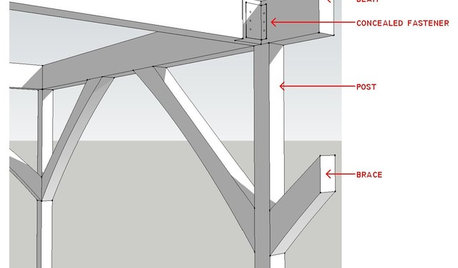Must-haves for construction contract?
We are nearing finalization of our house plans, are interviewing builders and preparing to sign on the dotted line. I am making a very detailed list of specifications and am looking at fixed costs contracts. Are there any clauses I should definitely add to our contract? I don’t want to overlook something important.
Comments (76)
Kristin Petro Interiors, Inc.
4 years agolast modified: 4 years agoThe architect provides the plans. The builder prepares their contract using the architectural plans. My contract is separate from both.
With one builder, if I'm engaged in the project early, I'm also involved in the final pre-budget meeting with the builder and client. This is where we review and confirm the plans and materials specified on the architect's plans and I assist in the setting of the allowances (based on my communication with the client regarding their design expectations).
This particular process requires the client to engage with a builder before the final cost analysis is completed. The pre-budget meeting allows us to fit the final design and allowances to the budget instead of the other way around. But again, this is one process among many different ones.
Related Professionals
Aspen Hill Design-Build Firms · Schofield Barracks Design-Build Firms · University Park Home Builders · Bowling Green General Contractors · Brighton General Contractors · Davidson General Contractors · Evans General Contractors · Fort Lee General Contractors · Lake Forest Park General Contractors · Lakewood Park General Contractors · Middletown General Contractors · Mililani Town General Contractors · Saint Andrews General Contractors · Villa Park General Contractors · Warren General ContractorsKristin Petro Interiors, Inc.
4 years agolast modified: 4 years agoIf I had a dollar every time a contractor tried to dismiss my experience and qualifications in order to make themselves look better, I could retire. Sorry, Res. It doesn't work on me. There are MANY people here who have never bid a custom home design project, yet who have very valid perspectives and opinions. If you want total validation, you should probably start your own message board.
Kristin Petro Interiors, Inc.
4 years agoThe primary reason I come to these boards? To learn. I learn about homeowners' expectations, experiences, confusion. I learn how other pros operate, whether good or bad. I learn about new products, technology, methods. I learn about regional and cultural practices and how they impact design decisions. Only every now and again, I comment if I feel that my experience can offer a different perspective. No matter how many years you have been considered a "pro" in your field, if you ever decide to stop learning, you should probably quit.
It serves nobody to dismiss another point of view based on your own narrow experience (and yes, no matter how many years you have been practicing, all of our experience is narrow in the scheme of things). We can disagree without questioning anyone's professionalism.
User
4 years agolast modified: 4 years agoI am not a contractor: I am an architect and what the OP asked about is what I spent seven years learning and half a century practicing.
You are a supporting player in a project delivery method unique to home building that puts owners at the mercy of contractors and their self-serving contracts. I represent owners and give them the opportunity to control how their projects are delivered.
The OP is bidding the project with multiple contractors. Would you ask each contractor to submit a contract?
WestCoast Hopeful
4 years agoRES you make a lot of assumptions in this last comment. The OP said they are finalizing house plans and now are looking at builders. The architect is one of many people in a project not the only. You may offer one way for owners to achieve their end game but it is far from the only way.
Virgil Carter Fine Art
4 years agolast modified: 4 years agoWell...experience shows that there are a variety of realms of professional experience and standards of practice for the design and construction of custom single family homes.
For example, In the professional realm, there are architects, interior designers, landscape architects, general contractors to name a few.
In addition there are vendors, retailers, and trades people such as designers, drafters, kitchen and cabinet retailers and a long list of others.
Each of these has their own realm of "standard and accepted" set of business practices and documentation.
It's up to each consumer to wisely choose whom they will use for their residential project.Many architects use and recommend the documents and agreements published by The American Institute of Architects.
These documents are regularly reviewed, revised and published on a scheduled three-year basis by experienced teams of architects and construction attornies, among others.
The series of documents have have the benefit of legal testing over time and are considered as the "standard of the industry".
In answer to the OP's question about essential language for an owner-contractor agreement for construction OD a single family residence, one needs to look no further,
Good luck!
Kristin Petro Interiors, Inc.
4 years agoAnd plenty of excellent builders will walk away from a project if they cannot use their own contracts, which was my point. Again, another perspective worth considering if you are willing to have an open mind. But it doesn't sound like you are.
User
4 years agoIt serves nobody to dismiss another point of view based on your own narrow experience
You should take your own advice.
WestCoast Hopeful
4 years agoDid the owner actually say somewhere they were writing start to finish their own contract? If so I missed that. I thought they asked if there were clauses not to be missed?
Kristin Petro Interiors, Inc.
4 years agolast modified: 4 years agoNo sir, I was offering an alternative and never dismissed your opinion. Your perspective is certainly valid...I never said it wasn't. In my years of working as a professional designer, I have only had one project where the architect bid the job, and it was a remodel/addition. I have worked on dozens of new construction homes, and have never seen it. I also attended monthly AIA meetings for years (again, to learn how local architect's operate in our area). So whether or not you think it's the only way a new construction project should be bid, it simply isn't the norm everywhere. And the OP should be aware of this as they consider qualified builders in their own area.
Charles Ross Homes
4 years agoExcellent advice offered by bry911 (as usual) because it balances the both the legal perspective with the practical, real-world stuff.
I'd like to underscore one comment in particular: "Finally, remember...good houses are built by good builders, not good contracts." I'd like to add to that what I propose is its design equivalent: "Good houses are built by good builders, not by the perfect set of plans and specifications."
Don't get me wrong; I'm a proponent of professionally-produced home plans and specifications. Almost every project I work on is architect designed and that's my preference. But homeowners need to keep in mind that the most comprehensive, accurate, and complete set of plans and specifications--even accompanied by those additional cost architect construction administration services--- can't guarantee the desired outcome if the builder isn't capable of delivering the home to the desired schedule, quality and cost standards for whatever reason. And no, those reasons aren't typically ferreted out in the competitive-bid process.
roccouple
4 years agolast modified: 4 years agoOur builder wrote our contract. We read it ourselves and took it to a lawyer to check. Our builder was excellent. We had a contract and along with it about 12 pages of building specs.
none of the legalese in the contract affected us. However it is true that once the contract is signed extras are extra money. For example we added medicine cabinets after the fact and had to pay separately for install. We were a little surprised these weren’t “included”.
another thing is to check allowances. Ours turned out to be above average but the vendors we spoke to said that’s not typical. For example we had a $7 sq ft tile allowance and most builders around here do $4. I wouldnt necessarily change the contract for allowances but know if your allowances are low you’ll probably pay extra along the way.
I think it’s more important that a homeowner understands the overall financial structure of the contract and reads the building specs. You can miss the forest for the trees so to speak. bur We had a good builder.
Charles Ross Homes
4 years agoFor what it's worth, I prefer having the specifications as part of the construction plans rather than the contract. That provides easier access to the specifications for folks in the field who need to refer to them.
roccouple
4 years agolast modified: 4 years agoAnother thing for us is that our builder required that we get a lawyer to review the contract. He wouldn’t sign unless we had a lawyer review it. He had his own lawyer and all lawyers were listed on the document. Dont know how standard that is.
ours was a custom home on land we owned and we used the builders contractCharles Ross Homes
4 years agoWe encourage our clients to have their attorney review our construction contract, too. We don't typically document the client's attorney's contact information in our contract unless they are serving as the client's mechanic's lien agent.
User
4 years agolast modified: 4 years agoSpecifications are part of a construction Contract along with the Drawings and the Agreement. It doesn't matter if the Specifications are on the drawings or in a separate document but they should not be in the Agreement only referenced by it.
M R, if you need additional advice from someone who represents owners, contact me.
Charles Ross Homes
4 years agolast modified: 4 years ago@RES,
I think the content of your post is not what you intended.
Specifications should be incorporated in the construction contract as a contract document. For small- scale projects, including them in the body of a contract might work fine. In my experience, for larger projects such as construction of a custom home, including them in the plans is a practical means of giving trades better access to the information, albeit no guarantee that they'll read them. Ensuring they do is the role of the builder.
User
4 years agolast modified: 4 years agoAn Agreement defines the obligations of the parties and should not attempt to describe the specifics of the constrction work. One of the problems I see with many contractor written contracts is they include an abbreviated description of features, systems and materials that should be part of the design documents (drawings & specifications) especially when the contractor is not the designer as is the case here.
I'm not talking about kitchen remodeling. M R is building a home which is the subject of the forum.
User
4 years agoI'm also not talking about contractor designed houses. M R has a design and needs a contractor. The designer's drawings and specifications should be referenced by the contractors' proposals but not restated or otherwise modified.
Jeffrey R. Grenz, General Contractor
4 years agoMy preferences and practices are similar to @Charles Ross Homes. My contract but I will review the AIA documents in the future and likely use if provided. 100% of the architect produced construction docs I've been given over the years had little to no information on finishes, so we specify finishes and/or allowances in a contract addendum/attachment based on client interviews. I haven't seen AIA architects use AIA contracts for their own work so that is a good benchmark.
In CA most of the license qualifications are based on 4 years of journeyman level experience with credits for education. The testing is mostly regarding contracts and legal issues. The license requires a bond. The license board publishes several required clauses. Even with that, I wouldn't hire an architect or general contractor without several years post licence experience and references for the type of project you are proposing.User
4 years agolast modified: 4 years agoI didn't mention Addenda in the interest of brevity but they are a standard and necessary part of a construction contract. But restating what the designer has already documented can be a major headache for everyone.
If important design information is missing, I'm not sure how it would be possible to compare bids. I hope that is not the case for M R.
Charles Ross Homes
4 years agoIn the real world, not everyone hires an architect to design their custom home (gasp!), nor is it appropriate that everyone do so (double gasp!) For example, folks building a home based on a stock set of plans (triple gasp!) typically don't get a project-specific set of specifications as part of their stock plans. In such cases, homeowners and home builders are both well served to have a set of job-specific specifications included in their contract. Where construction is following the builder's documented standard practices, an abbreviated set may serve the purpose. If not, the homeowner can always post them here on houzz.com to benefit from a plethora of professional input.
Charles Ross Homes
4 years ago@Jeffrey R. Grenz, General Contractor,
In our company's 37-year history we've built homes for at least four architects, three parents of architects (two of whom had the wisdom to not hire their son or daughter to design their home) one daughter of an architect (who chose a stock plan. Yes, really.) and lots of attorneys. Never once used an AIA contract.User
4 years agolast modified: 4 years agoCA appears to have a good licensing requirement. In MA licensed residential contractors must pay into a fund that reimburses homeowners in the case of poor performance. There is no contractor license for larger projects; architects must provide what the state calls "Construction Control" which I did for the first half of my practice. It teaches you to manage projects effectively in order to survive.
WestCoast Hopeful
4 years agoSpecifications for our custom build were referenced, therefore incorporated, into both the design and build contracts.
bry911
4 years agoI think you all are letting the tail wag the dog a little bit.
In the recent thread, Lessons learned from your build, many people mentioned contract as some type of important lesson they learned. I suspect that the recommendation is largely based on some cognitive bias. I strongly suspect this is correlation without any real causation. I am willing to bet that on average good, organized contractors have good organized contracts. I propose that if you scored the most important attributes of a builder/contractor and grouped them together with other builders/contractors who scored similarly, that you would find that contracts had a lot less significance than people believe. There is a tendency to think that the bad things that come up in your build came up because they weren't in the contract, when in reality the bad things in your build would probably come up even if they were in the contract. We have seen too many examples of contractors ignoring the policies for change orders in their own contract to believe anything else.----
I agree with RES 99% of the time, however, this is one of those times that I have a few reservations. I like the AIA contract quite well, it does a great job of anticipating all the likely problems, however, I have reservations about overemphasizing its importance.
My family has a cabin that we recently had to reconstruct, were we to insist on an AIA contract, we would still be looking for someone and likely would have been blackballed or charged a substantial PITA premium. Despite best practices nationally, local customs are incredibly powerful, arming someone with the tools to get a great house in Boston may not get them a great house in rural Georgia. Note: I did say reservations rather than disagreement, it is possible that RES is working with more information than I have and is familiar with the OP's area.
User
4 years agolast modified: 4 years agoAll I know is M R has design documents and is bidding them with more than one contractor. I did not recommend AIA contracts, Virgil mentioned them. I was providing more detailed information for which form to use and how to buy it and where to find the AIA's excellent instructions for filling it out or modifying it.
What I did recommend is that MR be proactive and take control of the project and that if he didn't have that kind of skill or experience he should get help.
My experience with home building has taught me that the terms of an agreement do matter because after a project begins the parties develop selective memories about what was agreed upon and need a written guide to avoid unnecessary complications. I'm not going to go into detail; you should all know what I'm talking about. I originally emphasized need for the Specification to contain detailed descriptions of the procedures for Allowances, Clarifications, Revisions and Change Orders.
I can't offer advice based on the belief the project is in an area where contractor's are unfamiliar wth architect designed houses and I would have expected that information to be shared with us. Trying to modify a builder's contract is not something I have any desire to do. Making modifications to my proposed contract is something I expect to do.
Denita
4 years agoThis statement says it all: "My experience with home building has taught me that the terms of an agreement do matter because after a project begins the parties develop selective memories about what was agreed upon and need a written guide to avoid unnecessary complications."
bry911
4 years agolast modified: 4 years agoMy experience with home building has taught me that the terms of an agreement do matter because after a project begins the parties develop selective memories about what was agreed upon and need a written guide to avoid unnecessary complications
This may well be what you meant to advocate, but it is not what I took from the conversation. I point to your interaction with Kristen, how was she advocating against this? If this was the broader point, I apologize.
I don't disagree with your point above, but an addendum does not a contract make!
You could accomplish exactly what you are talking about with the proper construction documents and/or a memorandum of understanding that is enforced in the general contract without having to modify the builder's contract at all. I don't believe anyone is saying that you don't need the scope of work clearly spelled out, or that you should allow vagaries into the contract for things like allowances (which do happen) and change orders (which also happen). However, that is a far cry from dictating full contract terms.
My experience with home building has taught me it is much easier to put the rug where the dog walks rather than trying to teach the dog to walk where the rug is.
Charles Ross Homes
4 years ago@RES,
The OP stated "We are nearing finalization of our house plans, are interviewing builders and preparing to sign on the dotted line." I don't know from that statement whether they are bidding the plans around or selecting their builder on some other basis. If there was subsequent clarification, I missed it. I know that you have a strong preference for competitive bidding.
There are lots of alternatives to competitive bidding, but that's not the subject of this thread.
You did indeed suggest the OP "be proactive and take control of the project and that if he didn't have that kind of skill or experience he should get help." I infer from the OP's original statement that he/she is seeking professional help in the form of a home builder.
Although the design effort appears to be wrapping up, you also recommended the OP hire an architect. If they're not already working with one, it's a little late for that.
If a homeowner wants the life experience (a.k.a. adventure) of acting as their own GC, they can take full control of their project. For a homeowner to hire a professional builder while at the same time attempting to "take control" of the project is a recipe for problems. Professional home builders do not need their hands held by home owners or architects. If they do, I submit the homeowner has selected the wrong builder for the job and incurred additional expenses for third party hand holding as a consequence.Virgil Carter Fine Art
4 years agolast modified: 4 years agoSeems to me this conversation has lost track of the OP's request. The OP asked for comments about critical clauses for a owner-builder construction contract.
I suggested the OP review and become familiar with the content in AIA agreement forms, particularly the small projects agreement for construction.
RES gave more specific information on the relevant forms.
I also pointed out that the AIA forms are regularly reviewed and updated every three years by teams of architects and attornies, making the forms among the leading sources of relevant legal documents for the design-construction industry. And I pointed out that the documents benefit from continuing experience in being court tested.
All the OP (or anyone) has to do is obtain a copy of the relevant agreement form and read it. Read for yourself the generally accepted industry standards and decide for yourself which conditions are "critical" for your project.
Duscuss those conditions with builders of choice and evaluate their response to each critical condition.
Then make an informed selection decision about builder and agreement format and contents.
Whether or not an AIA contract is used or not, there is probably no better reference source and body of constantly updated and tested experience than the AIA documents and agreements.
All the OP has to do is read and select the subjects and language important to his project, followed by discussion with builders of choice.
It's simple, really!
bry911
4 years agolast modified: 4 years agoVirgil, with respect, I still have some reservations about the OP's request and some of the provided information. I still want to caution against the tail wagging the dog. This is about finding the right builder and not about finding the right contract, I completely understand answering the OP's question thoroughly, but I am concerned that the tenor of several recent threads have skewed the importance of certain aspects of building.
-----
Must-haves for construction contract? = The right person signing on the other side. Everything else is subordinate to that and so don't let the pursuit of a perfect contract lead you away from the perfect builder. Holding all else equal a better contract will be better, but holding all else equal is a neat trick.
Virgil Carter Fine Art
4 years agoBry911, I certainly agree that the most important issue is finding the "right" experienced and business capable builder.
If the builder (or any other individual) doesn't want to do a proper job, all the words on a paper probably won't make it right.
But...the OP asked about critical clauses for an owner-builder agreement...and unless I missed somethin...no one...no one has really responded with any concrete and direct response...other than using the AIA agreement document as a reference resource.
I'm not getting any commissions from the AIA about this, so it really doesn't matter to me what the OP does.
Just trying to help in a tangible manner.WestCoast Hopeful
4 years agoSee as a homeowner, who just went through a build, I interpreted the post to be asking what should we look for in a contract? Not necessarily where can I find a contract or how can I write one start to finish but what should I be on the lookout for in the contracts I’m given. That said I admit I looked at it through that lens because that was how our build process unfolded. But it goes to show that all of us are just making assumptions.
User
4 years agolast modified: 4 years agoIn that case, there is no better source of information than the published instructions or filling out an AIA Owner-Contractor Agreement.
By the way, the AIA docents are revised every 10 years and all you get from the AIA for being a member is a discounted price.
WestCoast Hopeful
4 years agoSounds like a fabulous resource that could give someone lots of great ideas. I would have loved to come across this thread pre-build not just for the document you suggest but for personal experiences too and hearing from different people in the field.
Sue
4 years agoFood for thought. I am in the middle of doing a renovation and I was ready to sign on the dotted line until I had an attorney (I'm blessed that I work for a law firm), review the contract submitted to me by the contractor. He brought up so many things that I had no clue to look for and told me that the contract was very one sided. Since you are spending a significant amount of money for a new home, it may be worth it to spend a little more on a construction attorney to review the contract to make sure that you have a leg to stand on if something goes wrong. Sending best wishes.
Jeffrey R. Grenz, General Contractor
4 years agoMine says the same about contracts that are sent to me. Most all contracts are relatively one sided, created by the contractor, vendor or architect. Contracts won't protect you enough from the wrong contractor.
Charles Ross Homes
4 years agoNot legal advice, but a builder's opinion: A fair and balanced construction agreement should include two termination clauses: one for termination by the owner and one for termination by the builder. Each should define the basis for seeking termination of the agreement.
bry911
4 years agolast modified: 4 years ago"A proper termination clause will help quite a bit if you hire the wrong contractor."
If we look at A105- 2017 Standard Short Form of Agreement Between Owner and Contractor, we can see an example of a proper termination clause. Which seems great until you understand that it does almost nothing. Many contracts will contain language spelling out statutory or common law that exist whether or not it is included in the contract. This is an example of that.
The English Common law for damages from breach of contract has been around since before there were even 13 colonies, and it is really rather simple. The offending party must make the damaged party whole. If the contractor breaches he must pay any marginal costs to complete construction. If the homeowner breaches he must pay pay for the contractor's marginal profit (you have to pay for the hole in his schedule). Really it is just the homeowner agreed to pay X, had you not breached he would have paid X. So making him whole means adjusting his actual payments to X. A contractor agreed to a certain profit, had you not breached he would have made that profit. So making him whole means paying that profit.
There are rules that the AIA contract spells out about notification and time to correct, but they are largely the same rules that exist without being spelled out. Furthermore, the right to breach doesn't necessarily make breaching a great idea and I would bet 60% of home builds contain some breach that could be material if properly acted on.
So fighting for a proper termination clause may do little other than increase the need for it, when your preferred contractor walks... not that a good contractor will have issues with this specifically, but too many of these contract demands may be problematic.
There is some value in having someone read out and sign that they understand this to be the agreement, but again, I am unsure that in the end the juice is worth the squeeze.
----
Please note, I am not against construction contracts and I believe the AIA documents are some of the best and most fair contracts out there. Nor am I against fighting for certain strong elements of a contract as I think there are places where they are immensely important. I just happen to think the strongest elements of a contract should be exactly what the contractor is doing a reasonable idea of when he is doing it, exactly how you are going to pay in every situation, and other responsibilities that each of you have. Get those things straight and you are 95% of the way to a successful relationship.
Virgil Carter Fine Art
4 years agoExcellent comments by Bry911.
To add to the suggestions on construction contracts, I'd suggest consumers give serious atttention to the following:
1. What type of contract is best used for the project: a) Fixed cost; 2) Cost plus (with a guarenteed maximum, and a sharing of savings if final cost is below the guarenteed max); c) Time and materials.2. How are allowances (if any) handled.
3. How are change orders handled.
4. Retainage and procedure for progress payments.
5. Project close out procedures.
6. Termination porcedures.
7. Expected schedule.
Charles Ross Homes
4 years ago
I'll see your list and raise you one.
Not legal advice, but a couple of things from a builder's perspective that you may wish to include in a residential construction contract:
1. Make sure your contractor is legally qualified to perform the contract scope of work. Here in Virginia there are different classes of contractor's licenses which limit the scope and cost of work the contractor can legally perform. Some language stating the builder warrants that they are licensed to do the contract scope of work is helpful.
2. Make sure your contractor is required to pull any necessary permits. It's a red flag if your contractor asks you, the homeowner, to pull a permit.
3. Your contract should incorporate whatever state-specific language is required by law. A construction contract here in the Commonwealth of VA has some state-specific language that you won't find in the standard AIA A105.
4. Lots of threads on houzz.com relate to issues of quality. Your contract should reference whatever standard will be used to assess quality. The AIA A105 contract makes the architect both judge and jury with respect to correction of work that fails to conform to the contract documents. In my experience, while there may be some specifications included in the contract documents, a well written, objective, third-party standard such as RS Means Residential & Light Commercial Construction Standards or NAHB's Residential Construction Peformance Guidelines will better serve both homeowners and builders with respect to quality assessment and specific remedies required when the work fails to meet the quality standard.
5. You should define what "substantial completion" means. That might be a permanent certificate of occupancy, but there are times when it might be a temporary c.o. For example, one of the counties we work in requires that the site be stabilized with at least 80% of turf established before they'll issue a c.o. That's tough to do if you're trying to get grass to grow out of season or the sod farms have stopped cutting sod for the season.
6. Depending on the project site, your contract might need to specify surveys to be performed by a surveyor licensed in your state at particular milestones. For example, having the footings staked by a surveyor prior to excavation or requiring a foundation survey to ensure the home is built within the required set-backs before framing begins.
7. Your contract should include a written warranty or otherwise reference the applicable statutory warranty. The AIA A105 contract requires the contractor to correct work not conforming to the requirements of the contract documents for a period of one year after substantial completion. However, where we build contractors are required to remedy any work that doesn't comply with code requirements for a full three years after completion. I'd be concerned that you might get the short end of that stick if you use the AIA language, which is why I strongly recommend you don't sign anything before recommendation no. 8 below.
8. Have a local attorney with expertise in your state's contractor laws review the proposed contract before you sign it. That way you'll be sure it contains any required state-specific language and the contract terms don't provide less protection than state regulations would otherwise provide.bry911
4 years agolast modified: 4 years agoWouldn't any statutory requirements be inherent in the contract whether or not they are included? Usually omission of statutory language is handled in one of two ways, (1) the omitted requirements are enforceable against the maker of the contract but not by the maker of the contract, or (2) the omitted requirements remain enforceable against both parties.
It would be very rare that omission of statutory contract language voided the contract unless the primary purpose of the contract was avoidance of statutory requirements. It would be just as (exceedingly) rare for less protective or restrictive language to be enforced when more protective or restrictive language is required by statute.
Charles Ross Homes
4 years ago@bry911,
In my view, one of the important functions of a contract is to clearly articulate what each party agrees to do or is otherwise obligated to do. Consider that in my area most builders--except for large scale production builders-- don't have written warranties. Contract language noting that there is a statutory warranty obligation makes clear to both the homeowner and the builder that such an obligation exists. It may be redundant, but I don't think it does any harm to either party and indeed it probably does some good.User
4 years agolast modified: 4 years agoIf you wanted the 1 year extension of correction of the work in an AIA agreement to be longer you would simply change it. The online form generates a document that records all changes made to the original form.




















bry911